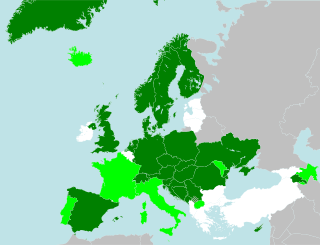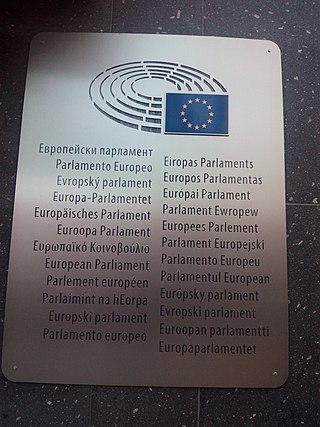Related Research Articles

The European Charter for Regional or Minority Languages (ECRML) is a European treaty adopted in 1992 under the auspices of the Council of Europe to protect and promote historical regional and minority languages in Europe. However, the charter does not provide any criterion or definition for an idiom to be a minority or a regional language, and the classification stays in the hands of the national state.

The Copenhagen criteria are the rules that define whether a country is eligible to join the European Union. The criteria require that a state has the institutions to preserve democratic governance and human rights, has a functioning market economy, and accepts the obligations and intent of the European Union.

The European Union (EU) has 24 official languages, of which three – English, French and German – have the status of "procedural" languages of the European Commission. The three procedural languages are those used in the day-to-day workings of the institutions of the EU.

The Directorate-General for European Civil Protection and Humanitarian Aid Operations, formerly known as the European Community Humanitarian Aid Office, is the European Commission's department for overseas humanitarian aid and for civil protection. It aims to save and preserve life, prevent and alleviate human suffering and safeguard the integrity and dignity of populations affected by natural disasters and man-made crises. Since September 2019, Janez Lenarčič is serving as Commissioner for Crisis Management in the Von der Leyen Commission, and since 1 March 2023, Maciej Popowski leads the organisation as the Director-General.

European Union culture policies aim to address and promote the cultural dimension of European integration through relevant legislation and government funding. These policies support the development of cultural activity, education or research conducted by private companies, NGO's and individual initiatives based in the EU working in the fields of cinema and audiovisual, publishing, music and crafts.
In varietate concordia is the official motto of the European Union (EU), adopted in 2000. Its translations in the other 24 official languages of the EU have equal standing. It is inspired by its Latin-language version coined by the Italian Nobel prize winner Ernesto Teodoro Moneta: In varietate concordia or In varietate unitas, which is also used as a compromise. It is one of the newest symbols of the European Union, alongside the European flag and anthem but, unlike most, it is specific to the EU rather than originating from the Council of Europe.

Kinga Gál is a Hungarian politician and Member of the European Parliament (MEP) from Hungary. She is a member of Fidesz.

The Framework Convention for the Protection of National Minorities (FCNM) is a multilateral treaty of the Council of Europe aimed at protecting the rights of minorities. It came into effect in 1998 and by 2009 it had been ratified by 39 member states.
Minority rights are the normal individual rights as applied to members of racial, ethnic, class, religious, linguistic or gender and sexual minorities, and also the collective rights accorded to any minority group.

Leonard Orban is a Romanian independent technocrat who served as the Commissioner for Multilingualism in the European Commission, the executive body of the European Union (EU). He was responsible for the EU language policy and was the first Romanian Commissioner and the first member of the Commission whose portfolio is exclusively multilingualism. His term of office began on 1 January 2007 and ended on 9 February 2010. With a background in engineering and economics, Orban has taken up various posts working for the accession of Romania to the European Union, most prominently as Deputy and later as Chief Negotiator for his country at the time of final negotiations with the European Union.
South Slavic language spoken in North Macedonia and some adjacent areas has been referred to using several different terms. Its native speakers, as well as the Constitution of North Macedonia, call it Macedonian language. It is also the name under which the language is internationally recognized. However, for historical reasons, as well as due to the Macedonia naming dispute, several other terms of reference are used when describing or referring to the language. Some of the names use the family to which the language belongs to disambiguate it from the non-Slavic ancient Macedonian language, a different language in the Hellenic branch; sometimes the autonym "Makedonski" is used in English for the modern Slavic language, with "Macedonian" being reserved for the ancient language. There is also a dialect of Modern Greek called Macedonian Greek and spoken by the Greek Macedonians. Such variations in nomenclature are often due to political opposition from Greece rather than scientific or linguistic reasons, as the usage of the term Macedonian to describe the Slavic language remains dominate in academic and international circles.
Linguistic rights are the human and civil rights concerning the individual and collective right to choose the language or languages for communication in a private or public atmosphere. Other parameters for analyzing linguistic rights include the degree of territoriality, amount of positivity, orientation in terms of assimilation or maintenance, and overtness.
Language law of Slovakia is primarily governed by two acts:

The European Citizens' Initiative (ECI) is a European Union (EU) mechanism aimed at increasing direct democracy by enabling "EU citizens to participate directly in the development of EU policies", introduced with the Treaty of Lisbon in 2007. This popular initiative enables one million citizens of the European Union, with a minimum number of nationals from at least seven member states, to call directly on the European Commission to propose a legal act in an area where the member states have conferred powers onto the EU level. This right to request the commission to initiate a legislative proposal puts citizens on the same footing as the European Parliament and the European Council, who enjoy this right according to Articles 225 and 241 of the Treaty on the Functioning of the European Union (TEFU). The commission holds the right of initiative in the EU. The first registered ECI, Fraternité 2020, was initiated on 9 May 2012, although the first submitted ECI was One Single Tariff.

Ramona Nicole Mănescu is a Romanian politician and lawyer. From 24 July 2019 to 4 November 2019, she served as minister of Foreign Affairs in the Romanian Government. She was a Member of the European Parliament serving 2007 to 2013 and 2014 to 2019 from the National Liberal Party, active within the European People's Party. As part of this group she is a member of the European Parliament Committee on Foreign Affairs, vice-chair in the Delegation for relations with the Mashreq countries and a substitute member in the Committee on transport and tourism and in Delegation for relations with the Arab Peninsula.

Helena Dalli is a Maltese politician serving as European Commissioner for Equality since 1 December 2019. She is a member of the Labour Party.
European Foundation of Human Rights or EFHR is an organization established in 2010 in Lithuania in response to the increasing number of human rights violations within the country of Lithuania, and more specifically regarding the rights of ethnic minorities.

Minority SafePack – one million signatures for diversity in Europe is an ongoing European Citizens' Initiative on minority rights in the EU, sponsored by FUEN.
The European Language Equality Network (ELEN) is an international non-governmental organization that is active at the European level which works to protect and promote European lesser-used languages, i.e. regional languages, minority languages, endangered languages, co-official languages and national languages of small nations.
The Euromosaic project is a study and survey of minority and regional languages in member states by the European Commission of the European Community (EC) and its successor, the European Union (EU). The study documented the linguistic diversity of the 12 original EC countries and later of its newer members who joined the EU.
References
- ↑ "Microsoft Word - Multilingualism2part1.doc" (PDF). Europarl.europa.eu. Retrieved 2017-01-12.
- ↑ "Report with recommendations to the Commission on European regional and lesser-used languages - the languages of minorities in the EU - in the context of enlargement and cultural diversity- Committee on Culture, Youth, Education, the Media and Sport - A5-0271/2003". Europarl.europa.eu. Retrieved 2017-01-12.
- ↑ "EBLUL - European Bureau for Lesser-Used Languages - EBLUL Closing Statement". 2012-04-26. Archived from the original on 2012-04-26. Retrieved 2021-09-02.
- ↑ "ELEN | European Language Equality Network". Elen.ngo. Retrieved 2017-01-12.
- ↑ "Framework Convention for the Protection of National Minorities" (PDF). Coe.int. Retrieved 2017-01-12.